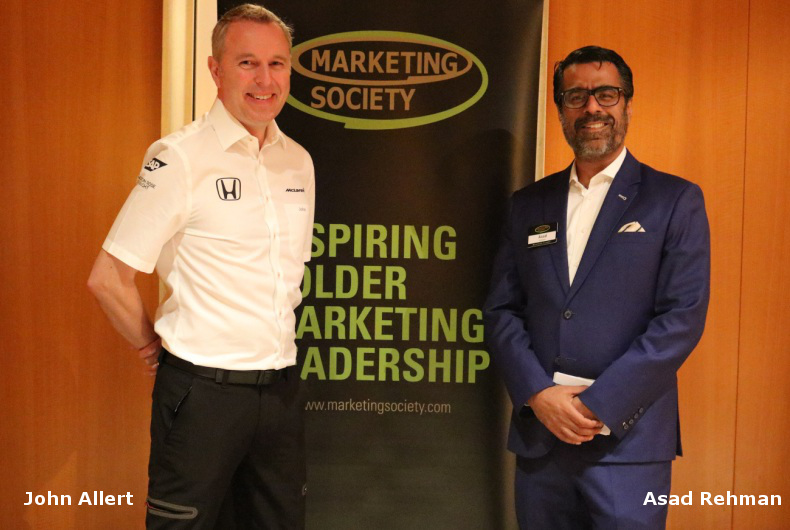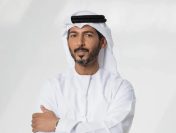 High-speed, performance-centric, cutthroat, resilient are only some of the traits that associate with Formula One (F1), and according to McLaren Technology Group’s Chief Marketing Officer, John Allert, there is much that the technologically savvy world of racing can teach to the marketing fraternity.
High-speed, performance-centric, cutthroat, resilient are only some of the traits that associate with Formula One (F1), and according to McLaren Technology Group’s Chief Marketing Officer, John Allert, there is much that the technologically savvy world of racing can teach to the marketing fraternity.
In a breakfast hosted by The Marketing Society in Dubai, one of the several initiatives that the Society undertakes for its members to hear from global and regional leaders, Mr Allert fielded questions from Asad Rehman, Director Media for Unilever North Africa and Middle East and the Chairman for The Marketing Society Middle East.
Mr Allert’s journey, that began as a designer, evolving to branding to his current mandate as a CMO, has allowed him a differentiated perspective on what it means to stay ahead in a high chase business, where the speed of change outpaces all else.
Underlining the message of being brave in marketing, a call that The Marketing Society Middle East has stood for since its inception in the region, Mr Allert drew examples from the McLaren experience where being bold has been intrinsic to the company’s decisions.
“It is in our DNA. We have a restless business that is very ambitious. This was one of the main reasons I joined the company 11 years ago,” he said.
At present, McLaren’s billion dollar business employs over 4000 people and delves not only in F1 but also has a supercar division in McLaren Automotive that uses F1 technology and expertise to create advanced sports cars. It also has a technology consulting business, McLaren Applied Technologies, which applies the technical and R&D skills developed by McLaren in motor racing to companies outside the automotive world.
Mr Allert points out that the group demonstrated courage when it realized that F1, a business that it was in since 1963, was not scalable and it diversified to take on the likes of Ferrari and Lamborghini or branched into applied technology in adjacent businesses.
Eyes On The Future
For a company such as McLaren, given its significant heritage in F1 that includes 20 world championships, 182 race wins, and a roll call of global racing champions, there is pride in legacy. However, in the last year, the group has turned its narrative to focus on the future.
“We have been able to do this carefully; the heritage story is fundamental but more than looking back, there is magic in the genuine brand story itself,” Mr Allert said.
Another wave of future came in with the change in ownership of F1 that Mr Allert describes as “clouds parting”. “In the past, F1 was marketed across traditional media as a cohesive sport. It created massive value for shareholders and teams. But it did not collaborate among teams, commercial rights holder or develop any digital channels. This is all changing now,” he observed.
The bigger consequence is that like any franchise, F1 has now put the customer at the heart of the business. He said, “When you put the stakeholder, which in this case is the fan, and make the sport as resonant as possible, sponsors come. Everything is lined up to build the popularity of the sport.”
The Es
Mr Allert also reflected on McLaren’s stand on esports and Formula E, both of which are spaces that it has invested in.
He sees esports as complementary to F1 itself. It may be recalled that earlier this month, McLaren named Ben Payne as the inaugural director of esports. Mr Allert however cautioned that esports was becoming an area that everyone felt almost obliged to be part of, but did not really know how. McLaren tested the space by designing a competition to fight the best, irrespective the device. The company appointed the winner, essentially a gamer, as part of the F1 team as one of the stimulation drivers.
Formula E for him is where business and marketing needs fuse. He explained, “You cannot disaggregate the two. We are business led in embracing alternative power. Formula E is interesting but it not at a point yet where it is attractive to mainstream partners. It still does not have a large footprint but it is an area we are watching. We have commercial exposure to Formula E and we see this space transition.”
He quoted McLaren’s relationship with the likes of GSK and its joint venture with Deloitte for software based analytical business tools as areas of applied technology that keeps the company future ready and relevant for a host of businesses. “We bring efficiencies in a diverse range of businesses. We are doing extraordinary things that for us are normal but are disruptive for these industries,” he remarked.
Built For Speed
Among the various lessons that F1 as a sport teaches to marketers, one is around ruthless prioritization. “This is a phenomenally exciting space where people work with incredible sportspeople. There is an unmatched level of determination and preparation but F1 is also incredibly political and cutthroat. It is no place for the faint hearted,” Mr Allert commented.
To survive the tumultuous world of F1, the players are required to be data fluent, evidence and insight based, and resilient to change. “Everything in F1 is changing all the time and marketing within F1 works at that speed.”
The McLaren team is designed to deal with that speed while not compromising on sophistication. The marketing team is around 75 people comprising skillsets from brand strategy, design services and digital. “We effectively have broken the traditional model and fused agency and the rights holder together. We created more of an agency model. The speed and sophistication at which we are required to work has mandated this change,” Mr Allert said.
Next on his agenda is the Abu Dhabi Grand Prix that has traditionally become the last race of the season. For McLaren, given the ownership of Bahrain Mumtalakat Holding in the company, the Middle East is a special relationship. “We have special affection but our shareholders see us as an international business and brand, with roots in the UK. They take great pride in articulating that we are the best of British engineering,” he said.




